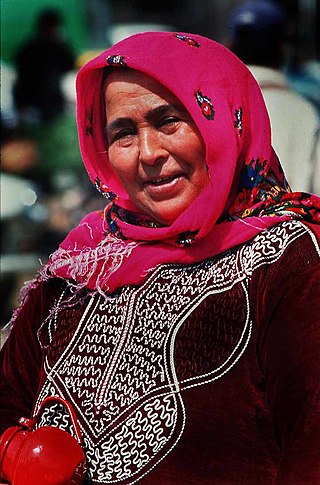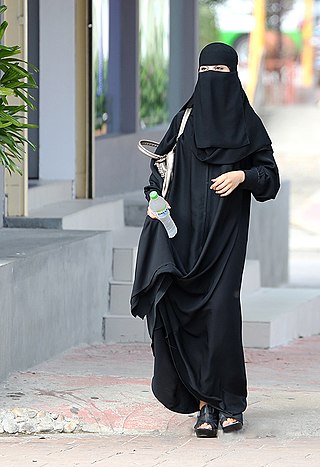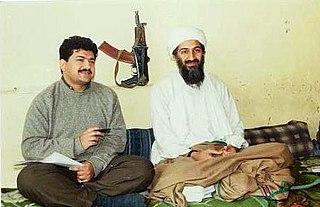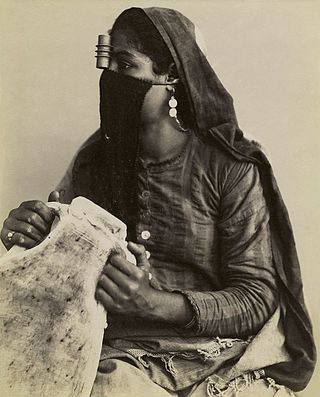Related Research Articles
Islamism is a religio-political ideology. The advocates of Islamism, also known as "al-Islamiyyun", are dedicated to realizing their ideological interpretation of Islam within the context of the state or society. The majority of them are affiliated with Islamic institutions or social mobilization movements, often designated as "al-harakat al-Islamiyyah." Islamists emphasize the implementation of sharia, pan-Islamic political unity, the creation of Islamic states,, and rejection of non-Muslim influences—particularly Western or universal economic, military, political, social, or cultural.

The Society of the Muslim Brothers, better known as the Muslim Brotherhood, is a transnational Sunni Islamist organization founded in Egypt by Islamic scholar and schoolteacher Hassan al-Banna in 1928. Al-Banna's teachings spread far beyond Egypt, influencing today various Islamist movements from charitable organizations to political parties.

In modern usage, hijab generally refers to various head coverings conventionally worn by many Muslim women. It is similar to the tichel or snood worn by Orthodox Jewish women, certain headcoverings worn by some Christian women, such as the mantilla, apostolnik and wimple, as well as the dupatta worn by many Hindu and Sikh women. While a hijab can come in many forms, it often specifically refers to a headscarf, wrapped around the head, covering the hair, neck and ears, but leaving the face visible. The use of the hijab has been on the rise worldwide since the 1970s and is viewed by many Muslims as expressing modesty and faith. There is a consensus among Islamic religious scholars that covering the head is either required or preferred, though some Muslim scholars and activists argue that it is not mandated.

Al-Muhajiroun is a proscribed militant network based in Saudi Arabia. The founder of the group was Omar Bakri Muhammad, a Syrian who previously belonged to Hizb ut-Tahrir; he was not permitted to re-enter Britain after 2005. According to The Times, the organisation has been linked to international terrorism, homophobia, and antisemitism. The group became notorious for its September 2002 conference "The Magnificent 19", praising the September 11, 2001 attacks. The network mutates periodically so as to evade the law; it operates under many different aliases.

A niqāb or niqaab, also known as a ruband, is a long garment worn by some Muslim women in order to cover their entire body and face, excluding their eyes. It is an interpretation in Islam of the concept of hijab, and is worn in public and in all other places where a woman may encounter non-mahram men. Most prevalent in the Arabian Peninsula, the niqab is a controversial clothing item in many parts of the world, including in some Muslim-majority countries.
Islamic feminism is a form of feminism concerned with the role of women in Islam. It aims for the full equality of all Muslims, regardless of gender, in public and private life. Islamic feminists advocate women's rights, gender equality, and social justice grounded in an Islamic framework. Although rooted in Islam, the movement's pioneers have also utilized secular, Western, or otherwise non-Muslim feminist discourses, and have recognized the role of Islamic feminism as part of an integrated global feminist movement.

Tareq Mohammed Al-Suwaidan is a Kuwaiti Islamic author and speaker, and businessman. He has been among the 500 Most Influential Muslims in 2022, 2023 and 2024. Al-Suwaidan is considered to adopt a moderate ideology amongst Muslim thinkers.

Ed Husain is a British author and a professor in the Walsh School of Foreign Service in Georgetown University. As a political advisor he has worked with leaders and governments across the world. He is also a senior fellow and director of the Atlantic Council’s N7 Initiative which is focused on peace in the Middle East and broadening and strengthening relationships between Israel and its Arab and Muslim neighbours. He has held senior fellowships at think tanks in London and New York, including at the Council on Foreign Relations (CFR) at the height of the Arab uprisings (2010–2015). While at CFR, his policy innovation memo led to the US-led creation of a Geneva-based global fund to help counter terrorism. He is also a member of the editorial board of the Studies in Conflict & Terrorism, a monthly peer-reviewed academic journal covering research on terrorism and insurgency.

Osama bin Laden took ideological guidance from prominent militant Islamist scholars and ideologues from the classical to contemporary eras, such as Ibn Taymiyya, Ibn al-Qayyim al-Jawziyyah, Sayyid Qutb and Abdullah Azzam. During his middle and high school years, bin Laden was educated in Al-Thager Model School, a public school in Jeddah run by Islamist exiles of the Muslim Brotherhood; during which he was immensely influenced by pan-Islamist ideals and displayed strict religious commitment. As a teenager, bin Laden attended and led Muslim Brotherhood-run "Awakening" camps held on desert outskirts that intended to raise the youth in religious values, instil martial spirit and sought spiritual seclusion from "the corruptions" of modernity and rapidly urbanising society of the 1970s in Saudi Arabia.
Muslim supporters of Israel refers to both Muslims and cultural Muslims who support the right to self-determination of the Jewish people and the likewise existence of a Jewish homeland in the Southern Levant, traditionally known as the Land of Israel and corresponding to the modern polity known as the State of Israel. Muslim supporters of the Israeli state are widely considered to be a rare phenomenon in light of the ongoing Israeli–Palestinian conflict and the larger Arab–Israeli conflict. Within the Muslim world, the legitimacy of the State of Israel has been challenged since its inception, and support for Israel's right to exist is a minority orientation. Pro-Israel Muslims have faced opposition from both moderate Muslims and Islamists.

Norah bint Abdullah Al Faiz, also spelled Noura Al Fayez, is the first woman to hold a cabinet-level office in Saudi Arabia. She was vice minister of education from 2009 to 2015.
Sherifa D. Zuhur is an academic and national security scholar of the Middle East and Islamic world. She was most recently a visiting scholar at the Center for Middle East Studies, University of California, Berkeley and is the director of the Institute of Middle Eastern, Islamic and Strategic Studies.
Syed Zaid Zaman Hamid, better known as Zaid Hamid, is a Pakistani far-right, radical Islamist political commentator and conspiracy theorist.

In a predominantly Muslim society, as many as 90% of women in Egypt have adopted a form of veiling. A majority of Egyptian women cover at least their hair with the hijab. A hijab refers to a head covering that is worn by Muslim women. Although the phenomenon of wearing the niqāb, a veil which covers the face is not as common, the niqab in Egypt has become more prevalent. While a few women in Egypt wear a black niqab along with a billowing black abaya as seen in countries such as Saudi Arabia, many choose to wear different colors of the niqab or manipulate the hijab to cover their face. Regardless, the growing trend of munaqqabat, or women who wear the niqab, has alarmed the authorities. They have begun to see this dress as a security threat, because it hides the face, and because it is perceived as a political statement, a rejection of the state in favor of a strict Islamic system.

The Yemeni Congregation for Reform, frequently called al-Islah, is a Yemeni Sunni Islamist movement established in 1990 by Abdullah ibn Husayn al-Ahmar, Ali Mohsen al-Ahmar, Abdul Majeed al-Zindani, with Ali Saleh's blessing. The first article of Islah basic law defines it as "a popular political organization that seeks reform of all aspects of life on the basis of Islamic principles and teachings".

Petro-Islam is a neologism used to refer to the international propagation of the extremist and fundamentalist interpretations of Sunni Islam derived from the doctrines of Muhammad ibn Abd al-Wahhab, a Sunni Muslim preacher, scholar, reformer and theologian from Uyaynah in the Najd region of the Arabian Peninsula, eponym of the Islamic revivalist movement known as Wahhabism. This movement has been favored by the Kingdom of Saudi Arabia and the other Arab states of the Persian Gulf.

Sahwa movement or Al-Sahwa Al-Islamiyya was a movement in Saudi Arabia from 1960–1980 which advocated for incorporating more reliance on Wahhabi principles into Saudi society. The most noticeable effects of the movement were significant restrictions on women's rights, religious freedom, and personal liberties. The movement's core doctrines were shaped by the fundamentalist tenets of Qutbism; such as theological denunciations of democracy and the belief that contemporary governments of the Muslim World have apostatised.
Starting in the mid-1970s and 1980s, Salafism and Wahhabism — along with other Sunni interpretations of Islam favored by the Kingdom of Saudi Arabia and other Gulf monarchies — achieved a "preeminent position of strength in the global expression of Islam."
The Global Anti-Aggression Campaign (GAAC) is a human rights non-governmental organization ostensibly established to resist foreign aggression against Islam, Muslims, and Muslim countries in a manner that complies with the Sunni-Islamic faith. The Global Anti-Aggression Campaign consists of a number of religious leaders, intellectuals, and human rights activists from the Arab World and holds annual conferences to advance their stated objectives and discuss Western and Israeli aggression on Muslim communities.
Following the embargo by Arab oil exporters during the Israeli-Arab October 1973 War and the vast increase in petroleum export revenue that followed, the international propagation of Salafism and Wahhabism within Sunni Islam favored by the conservative oil-exporting Kingdom of Saudi Arabia and other Gulf monarchies achieved a "preeminent position of strength in the global expression of Islam." The Saudi interpretation of Islam not only includes Salafiyya but also Islamist/revivalist Islam, and a "hybrid" of the two interpretations.
References
- 1 2 3 4 5 "Bio". 24 May 2016.
- ↑ "Face to faith: The search for Muslim identity | Qanta Ahmed". TheGuardian.com . 11 December 2010. Archived from the original on 10 August 2017. Retrieved 18 July 2017.
- 1 2 3 Maltz, Judy (31 May 2013). "The many faces of Dr. Qanta Ahmed". Haaretz . Archived from the original on 25 September 2015. Retrieved 4 June 2016.
- ↑ "Dr. Qanta Ahmed on Trump and Muslims in America - CNN Video". CNN . 9 December 2015.
- ↑ Sleep Medicine Specialist, NYU Winthrop Hospital, archived from the original on 11 September 2011.
- ↑ Ahmed, Qanta A. (7 January 2011). "Fulfilling Our Duty as Muslim-Americans". Wall Street Journal . Archived from the original on 2 June 2016. Retrieved 5 June 2016.
- ↑ Ahmed, Qanta. "Qanta Ahmed, MD". Huffington Post . Archived from the original on 23 April 2016. Retrieved 4 June 2016.
- ↑ "Books: 'In the Land of Invisible Women'". Seattle Post-Intelligencer . 4 September 2008. Archived from the original on 21 February 2014. Retrieved 4 June 2016.
- ↑ Schwartz, Stephen (8 September 2008). "Pierce the Veil". The Weekly Standard. Archived from the original on 19 September 2015. Retrieved 4 June 2016.
- ↑ Harris, Nancy (17 September 2010). "Historical fiction helps Hingham woman appreciate her own era". Boston Globe . Archived from the original on 5 March 2016. Retrieved 4 June 2016.
- ↑ "Muslim reformists sound off on attacks against Christians". Fox News . 11 June 2019. Retrieved 20 March 2021.
- ↑ Ahmed, Qanta (2008). In the Land of Invisible Women: A Female Doctor's Journey in the Saudi Kingdom. Sourcebooks, Incorporated. ISBN 978-1402210877.
- ↑ "In the Land of Invisible Women".
- 1 2 Ahmed, Qanta A. (10 March 2017). "Designate the Muslim Brotherhood a Foreign Terrorist Organization". National Review . Archived from the original on 31 January 2018. Retrieved 5 January 2019.
- 1 2 Ahmed, Qanta (23 December 2018). "As a Muslim woman I'd like to thank Boris Johnson for calling out the burka". The Spectator . Retrieved 16 March 2021.
- ↑ "Qanta Ahmed: Ilhan Omar is a disgrace to Islam and doesn't represent my Muslim religion". Fox News . 14 April 2019.
- ↑ Ahmed, Qanta A (25 May 2011). "Adventures of an Accidental Zionist: Encounters with the Anxiety of Jewish Extinction". The Huffington Post . Archived from the original on 18 July 2017. Retrieved 24 November 2018..